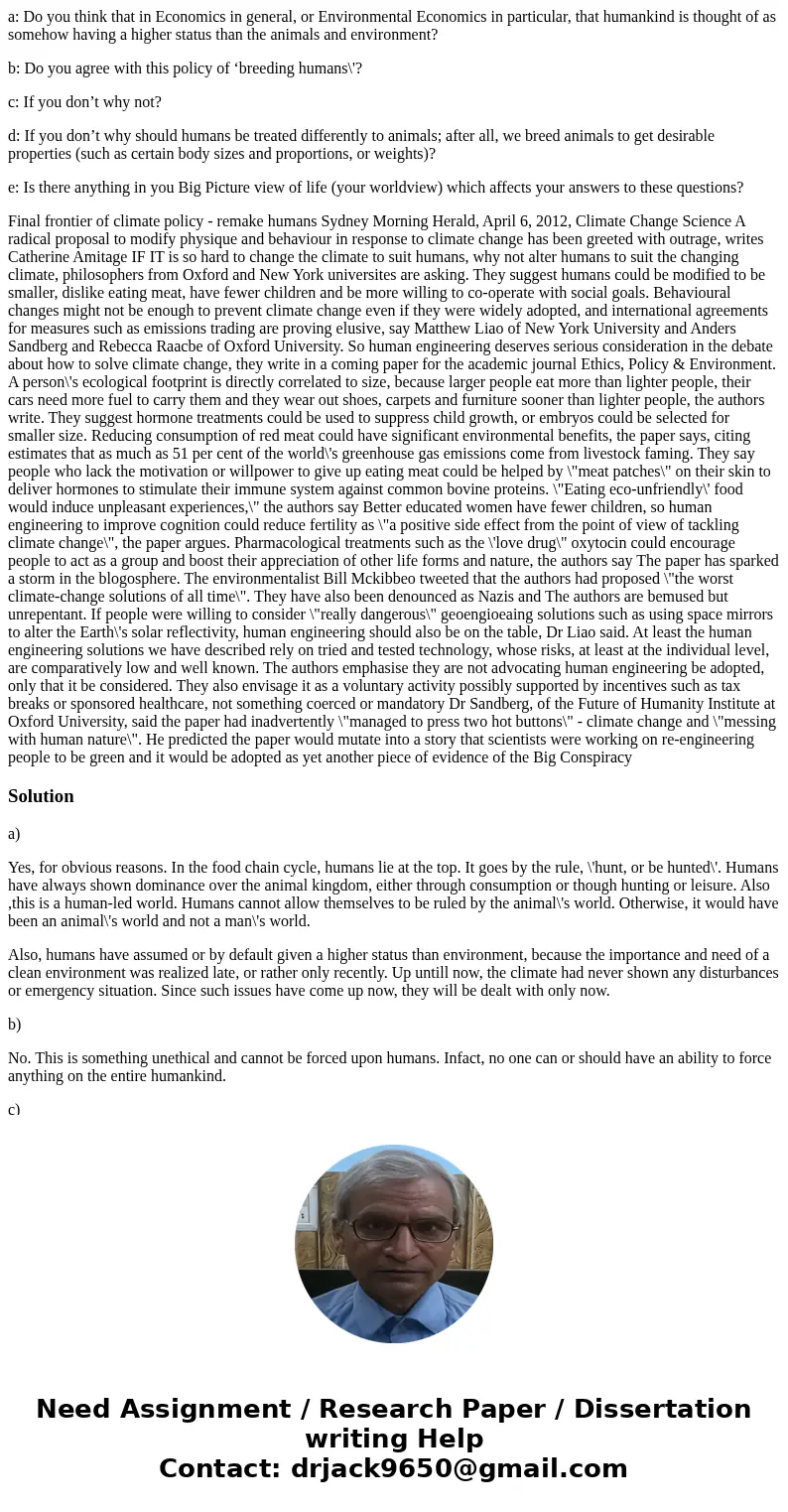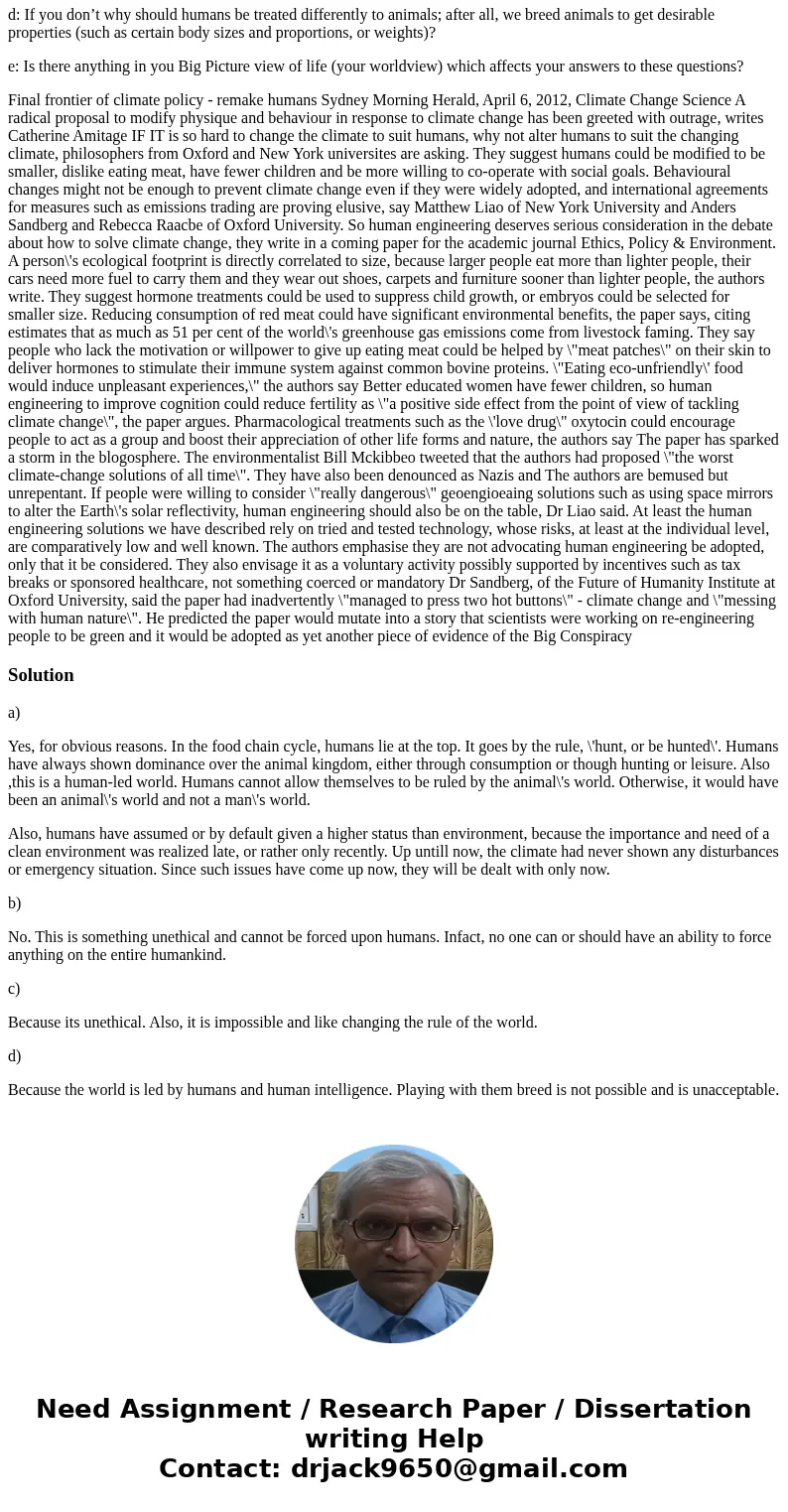a Do you think that in Economics in general or Environmental
a: Do you think that in Economics in general, or Environmental Economics in particular, that humankind is thought of as somehow having a higher status than the animals and environment?
b: Do you agree with this policy of ‘breeding humans\'?
c: If you don’t why not?
d: If you don’t why should humans be treated differently to animals; after all, we breed animals to get desirable properties (such as certain body sizes and proportions, or weights)?
e: Is there anything in you Big Picture view of life (your worldview) which affects your answers to these questions?
Final frontier of climate policy - remake humans Sydney Morning Herald, April 6, 2012, Climate Change Science A radical proposal to modify physique and behaviour in response to climate change has been greeted with outrage, writes Catherine Amitage IF IT is so hard to change the climate to suit humans, why not alter humans to suit the changing climate, philosophers from Oxford and New York universites are asking. They suggest humans could be modified to be smaller, dislike eating meat, have fewer children and be more willing to co-operate with social goals. Behavioural changes might not be enough to prevent climate change even if they were widely adopted, and international agreements for measures such as emissions trading are proving elusive, say Matthew Liao of New York University and Anders Sandberg and Rebecca Raacbe of Oxford University. So human engineering deserves serious consideration in the debate about how to solve climate change, they write in a coming paper for the academic journal Ethics, Policy & Environment. A person\'s ecological footprint is directly correlated to size, because larger people eat more than lighter people, their cars need more fuel to carry them and they wear out shoes, carpets and furniture sooner than lighter people, the authors write. They suggest hormone treatments could be used to suppress child growth, or embryos could be selected for smaller size. Reducing consumption of red meat could have significant environmental benefits, the paper says, citing estimates that as much as 51 per cent of the world\'s greenhouse gas emissions come from livestock faming. They say people who lack the motivation or willpower to give up eating meat could be helped by \"meat patches\" on their skin to deliver hormones to stimulate their immune system against common bovine proteins. \"Eating eco-unfriendly\' food would induce unpleasant experiences,\" the authors say Better educated women have fewer children, so human engineering to improve cognition could reduce fertility as \"a positive side effect from the point of view of tackling climate change\", the paper argues. Pharmacological treatments such as the \'love drug\" oxytocin could encourage people to act as a group and boost their appreciation of other life forms and nature, the authors say The paper has sparked a storm in the blogosphere. The environmentalist Bill Mckibbeo tweeted that the authors had proposed \"the worst climate-change solutions of all time\". They have also been denounced as Nazis and The authors are bemused but unrepentant. If people were willing to consider \"really dangerous\" geoengioeaing solutions such as using space mirrors to alter the Earth\'s solar reflectivity, human engineering should also be on the table, Dr Liao said. At least the human engineering solutions we have described rely on tried and tested technology, whose risks, at least at the individual level, are comparatively low and well known. The authors emphasise they are not advocating human engineering be adopted, only that it be considered. They also envisage it as a voluntary activity possibly supported by incentives such as tax breaks or sponsored healthcare, not something coerced or mandatory Dr Sandberg, of the Future of Humanity Institute at Oxford University, said the paper had inadvertently \"managed to press two hot buttons\" - climate change and \"messing with human nature\". He predicted the paper would mutate into a story that scientists were working on re-engineering people to be green and it would be adopted as yet another piece of evidence of the Big ConspiracySolution
a)
Yes, for obvious reasons. In the food chain cycle, humans lie at the top. It goes by the rule, \'hunt, or be hunted\'. Humans have always shown dominance over the animal kingdom, either through consumption or though hunting or leisure. Also ,this is a human-led world. Humans cannot allow themselves to be ruled by the animal\'s world. Otherwise, it would have been an animal\'s world and not a man\'s world.
Also, humans have assumed or by default given a higher status than environment, because the importance and need of a clean environment was realized late, or rather only recently. Up untill now, the climate had never shown any disturbances or emergency situation. Since such issues have come up now, they will be dealt with only now.
b)
No. This is something unethical and cannot be forced upon humans. Infact, no one can or should have an ability to force anything on the entire humankind.
c)
Because its unethical. Also, it is impossible and like changing the rule of the world.
d)
Because the world is led by humans and human intelligence. Playing with them breed is not possible and is unacceptable.


 Homework Sourse
Homework Sourse